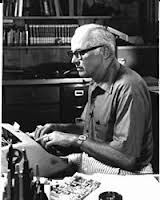by James Scott Bell
@jamesscottbell
 The late, great John D. MacDonald (author of the Travis McGee series, but even more enjoyable for me, a string of paperback originals in the 1950s) had a philosophy of writing. It’s found in the introduction to his short story collection, The Good Old Stuff:
The late, great John D. MacDonald (author of the Travis McGee series, but even more enjoyable for me, a string of paperback originals in the 1950s) had a philosophy of writing. It’s found in the introduction to his short story collection, The Good Old Stuff:
First, there has to be a strong sense of story. I want to be intrigued by wondering what is going to happen next. I want the people that I read about to be in difficulties–emotional, moral, spiritual, whatever, and I want to live with them while they’re finding their way out of these difficulties.
Second, I want the writer to make me suspend my disbelief. I want to be in some other place and scene of the writer’s devising.
Next, I want him to have a bit of magic in his prose style, a bit of unobtrusive poetry. I want to have words and phrases that really sing. And I like an attitude of wryness, realism, the sense of inevitability. I think that writing–good writing–should be like listening to music, where you identify the themes, you see what the composer is doing with those themes, and then, just when you think you have him properly identified, and his methods identified, then he will put in a little quirk, a little twist, that will be so unexpected that you read it with a sense of glee, a sense of joy, because of its aptness, even though it may be a very dire and bloody part of the book.
So I want story, wit, music, wryness, color, and a sense of reality in what I read, and I try to get it in what I write.
Isn’t that a nice credo for a writer? And JDM did put all that in what he wrote. Especially unobtrusive poetry, which is why he is still read today when most PBO writers have vanished into the mist.
Now, when it comes to style, we all have preferences. I know Isaac Asimov once explained that he developed a very plain style so he could just get on with telling the story. Maybe that’s the reason I haven’t read a lot of Asimov.
Ah, but Ray Bradbury! Now there’s a stylist. Check out Dandelion Wine or Something Wicked This Way Comes if you want to see what I mean.
 Recently I came across a pulp writer whose work I was unfamiliar with. Howard Browne wrote a series of mysteries under the pseudonym John Evans. They featured Chicago PI Paul Pine. Browne’s model was clearly (and, I believe, admittedly) Raymond Chandler. While Chandler stands alone in the pantheon of stylists, I enjoyed Browne’s unobtrusive poetry. Here are some samples from Halo for Satan (1948):
Recently I came across a pulp writer whose work I was unfamiliar with. Howard Browne wrote a series of mysteries under the pseudonym John Evans. They featured Chicago PI Paul Pine. Browne’s model was clearly (and, I believe, admittedly) Raymond Chandler. While Chandler stands alone in the pantheon of stylists, I enjoyed Browne’s unobtrusive poetry. Here are some samples from Halo for Satan (1948):
I shoved open the front door and went into a gloomy hall filled with last year’s air.
It wasn’t much of a room. About large enough to play solitaire if you held the cards close to your chest.
Her right hand was pointing a small blue-steel automatic at the sweet roll I’d had for breakfast.
“Hello there,” I said brightly. It took a little while to get the words out because they had to come all the way up from the cuffs of my trousers.
There was a faded housecoat wrapped primly around her shapeless body and a lacy pink dustcap sat drunkenly on graying hair that probably had already been combed once that month.
Describing his office building:
It was sandwiched between two modern skyscrapers that seemed forever to be trying to edge away from their neighbor. It had a deep lobby, narrow and dim, paneled in gray and white imitation marble, a pair of secondhand bird cages masquerading as elevators and a sullen air of decay. The upper halls smelled like a Kansas hayloft after two weeks of rain, and my fellow tenants ran the type of businesses that attracted more process servers than customers.
Delightful, eh? Well, I think so!
So how can you find your own unobtrusive poetry? A couple of tips:
First, notice things. I mean, notice them through the eyes of your POV character. Take time. Look around at the scene. Watch things happen in the theater of your mind. Make a list of what is seen.
Second, take several stabs at description. Experiment. Use up a whole page (or more if you’re really cooking) and have fun. I guarantee you’ll find some gold which you’ve tickled so she comes out laughing (a line of unobtrusive poetry from the film Treasure of the Sierra Madre).
You might also want to review my checklists for setting description and description of characters.
Now it’s your turn. Share some examples of style that you really like, or tell us about an authors who you love to read for the language.
